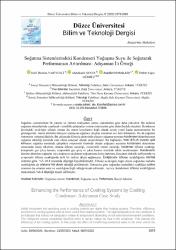| dc.contributor.author | Variyenli, Halil İbrahim | |
| dc.contributor.author | Şener, Abdülkadir | |
| dc.contributor.author | Khanları, Ataollah | |
| dc.contributor.author | Gürbüz, Emine Yağız | |
| dc.date.accessioned | 2021-03-31T12:02:12Z | |
| dc.date.available | 2021-03-31T12:02:12Z | |
| dc.date.issued | 2020 | en_US |
| dc.identifier.uri | https://doi.org/10.29130/dubited.723895 | |
| dc.identifier.uri | https://hdl.handle.net/20.500.12809/9118 | |
| dc.description.abstract | Soğutma sistemlerinde ilk yatırım ve işletme maliyetleri ısıtma sistemlerine göre daha yüksektir. Bu nedenle soğutma sistemlerinde yapılacak verimlilik çalışmaları ısıtma sistemlerine göre daha faydalı olacaktır. Kondenser üzerindeki sıcaklığın yüksek olması dış ortam koşullarına bağlı olarak ısısını yeteri kadar atamamasının bir göstergesidir. Isısını istenilen düzeyde atamayan soğutucu akışkan tamamen sıvı hale dönüşmez. Bu da soğutma sisteminin verimini düşürür. Bu çalışmada klima iç ünitesinde oluşan yoğuşma suyunun kondensere aktarılmasının soğutma etkinliği üzerinde olan etkisi deneysel olarak araştırılmıştır. Bu bağlamda, 9000 BTU/h inverter split klimanın soğutma modunda çalışırken evaporatör üzerinde oluşan yoğuşma suyunun kondensere aktarılması sonucunda enerji tüketimi, ortama üfleme sıcaklığı, evaporatör emme sıcaklığı, kondenser üfleme sıcaklığı, kompresör gaz çıkış basıncı, evaporatör gaz giriş ve çıkış basıncı üzerinde etkisi incelenmiştir. Kondenserin üzerine aktarılan yoğuşma suyu soğutucu akışkanın yoğuşmasını kolaylaştırmış, harcanan elektrik sarfiyatında ve evaporatör üfleme sıcaklığında belli bir miktar düşüş sağlamıştır. Evaporatör üfleme sıcaklığının normal sisteme göre %5-10.8 arasında düştüğü kaydedilmiştir. Üfleme sıcaklığına bağlı olarak soğutulan mahalin sıcaklığında da ortalama %8 olarak düştüğü görülmüştür. Sonuçlara göre soğutulan mahaldeki sıcaklığın azalma oranının dış ortamın nem ve sıcaklığına bağlı olduğu tespit edilmiştir. Ayrıca, kondenser üfleme sıcaklığının maksimum %6.4 düştüğü tespit edilmiştir. | en_US |
| dc.description.abstract | Initial investment and operating costs in cooling systems are higher than heating systems. Therefore, efficiency increment in cooling systems will be more useful than heating systems. The high temperature on the condenser is an indicator that it does not adequately release its temperature depending on the external environment conditions. The refrigerant cannot completely liquified when it cannot release its heat in the condenser. This reduces the efficiency of the cooling system. In this study, the effect of transferring condensed water in the inner unit to the condenser on the performance has been investigated experimentally. In this context, air conditioning system (9000 BTU/h) has been selected and condensed water in inner unit of the system has been transferred to the condenser unit. Then the effect of using this modification on energy consumption, average blowing air temperature, suction temperature of evaporator, output pressure of compressor, inlet and outlet pressure of evaporator has been studied. Depending on the blowing temperature, a significant reduction was observed in the temperature of the cooled area. In the modified system, evaporator blowing temperature was decreased between %5-10.8. According to the results, it was determined that the rate of decrease depends on the humidity and temperature of the external environment. In addition, a maximum reduction of 6.4% in the condenser blowing temperature was recorded. | en_US |
| dc.item-language.iso | tur | en_US |
| dc.publisher | Düzce Üniversitesi | en_US |
| dc.relation.isversionof | 10.29130/dubited.723895 | en_US |
| dc.item-rights | info:eu-repo/semantics/openAccess | en_US |
| dc.subject | Soğutma sistemi | en_US |
| dc.subject | Kondenser | en_US |
| dc.subject | Yoğuşma suyu | en_US |
| dc.subject | Performans | en_US |
| dc.subject | Enerji tüketimi | en_US |
| dc.title | Soğutma Sistemlerindeki Kondenseri Yoğuşma Suyu ile Soğutarak Performansın Arttırılması: Adıyaman İli Örneği | en_US |
| dc.item-title.alternative | Enhancing the Performance of Cooling Systems by Cooling Condenser: Adıyaman Case Study | en_US |
| dc.item-type | article | en_US |
| dc.contributor.department | MÜ, Teknoloji Fakültesi, Enerji Sistemleri Mühendisliği Bölümü | en_US |
| dc.contributor.authorID | 0000-0002-5200-8536 | en_US |
| dc.contributor.institutionauthor | Gürbüz, Emine Yağız | |
| dc.identifier.volume | 8 | en_US |
| dc.identifier.issue | 3 | en_US |
| dc.identifier.startpage | 2073 | en_US |
| dc.identifier.endpage | 2083 | en_US |
| dc.relation.journal | Düzce Üniversitesi Bilim ve Teknoloji Dergisi | en_US |
| dc.relation.publicationcategory | Makale - Uluslararası Hakemli Dergi - Kurum Öğretim Elemanı | en_US |


















